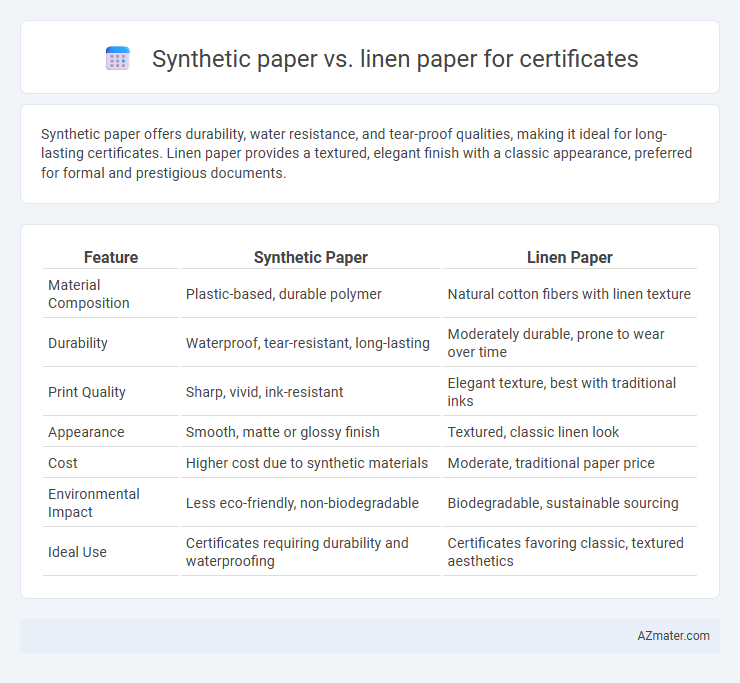Synthetic paper offers durability, water resistance, and tear-proof qualities, making it ideal for long-lasting certificates. Linen paper provides a textured, elegant finish with a classic appearance, preferred for formal and prestigious documents.
Table of Comparison
| Feature | Synthetic Paper | Linen Paper |
|---|---|---|
| Material Composition | Plastic-based, durable polymer | Natural cotton fibers with linen texture |
| Durability | Waterproof, tear-resistant, long-lasting | Moderately durable, prone to wear over time |
| Print Quality | Sharp, vivid, ink-resistant | Elegant texture, best with traditional inks |
| Appearance | Smooth, matte or glossy finish | Textured, classic linen look |
| Cost | Higher cost due to synthetic materials | Moderate, traditional paper price |
| Environmental Impact | Less eco-friendly, non-biodegradable | Biodegradable, sustainable sourcing |
| Ideal Use | Certificates requiring durability and waterproofing | Certificates favoring classic, textured aesthetics |
Introduction to Certificate Paper Types
Certificate paper types include synthetic paper and linen paper, each offering distinct qualities for official documents. Synthetic paper provides durability, water resistance, and tear-proof features, making it ideal for certificates that require longevity and resilience. Linen paper offers a textured, elegant appearance with a classic finish, favored for its professional look and traditional feel in formal certificates.
What Is Synthetic Paper?
Synthetic paper is a durable, tear-resistant material made from plastic polymers such as polypropylene, offering water and chemical resistance ideal for certificates requiring longevity and frequent handling. Unlike traditional linen paper, which features a textured, fabric-like surface made from cotton or wood fibers, synthetic paper provides a smooth and waterproof finish that maintains print quality over time. Its resilience against environmental factors makes synthetic paper a preferred choice for certificates that must withstand wear, moisture, and fading.
What Is Linen Paper?
Linen paper is a high-quality, textured paper that mimics the fabric-like weave of linen, often used for printing formal certificates, letterheads, and invitations due to its elegant appearance and durability. It offers a tactile, classic look with a subtle pattern that enhances the sophistication and perceived value of official documents. Unlike synthetic paper, which is water-resistant and tear-proof, linen paper maintains a traditional feel and is made from natural fibers, making it ideal for certificates requiring a refined and professional presentation.
Durability: Synthetic vs Linen Paper
Synthetic paper offers superior durability for certificates due to its resistance to water, tearing, and fading, making it ideal for long-term preservation and frequent handling. Linen paper, while providing a textured, classic appearance, is more susceptible to wear and damage over time, especially when exposed to moisture or rough handling. Choosing synthetic paper ensures enhanced longevity and robustness, critical for certificates requiring lasting value and resilience.
Print Quality Comparison
Synthetic paper offers superior print quality for certificates due to its smooth, waterproof surface that ensures sharp, vibrant colors and precise detail, resisting smudging and fading over time. Linen paper, characterized by its textured, fabric-like finish, produces a more traditional, elegant aesthetic but may result in less crisp printing and slight ink absorption variations. For high-definition text and images, synthetic paper outperforms linen paper in maintaining print clarity and color consistency on certificates.
Cost Analysis: Synthetic and Linen Paper
Synthetic paper generally incurs higher production costs due to its durable, water-resistant properties and polymer-based materials, making it more expensive than linen paper. Linen paper, made from cotton fibers with a textured finish, offers a cost-effective option for certificates while maintaining a premium appearance. For bulk orders, linen paper often provides better value, whereas synthetic paper's longevity justifies its higher price in specialized applications.
Environmental Impact and Sustainability
Synthetic paper offers high durability and water resistance, reducing waste by extending the certificate's lifespan compared to traditional linen paper. Linen paper, made from cotton fibers, is biodegradable and more easily recyclable, making it a more eco-friendly choice in terms of biodegradability and resource renewability. The environmental impact of synthetic paper is higher due to its petrochemical base and longer decomposition time, while linen paper supports sustainability through natural materials and lower carbon emissions during production.
Security Features for Certification
Synthetic paper offers advanced security features such as water resistance, tear resistance, and embedded anti-counterfeit elements that enhance certificate durability and authenticity verification. Linen paper provides a textured surface that naturally deters forgery through tactile security, often combined with watermarks and security threads. When choosing between synthetic and linen paper for certificates, the emphasis on robust anti-tampering qualities and longevity dictates the preferred security features for safeguarding official documents.
Best Use Cases for Each Paper Type
Synthetic paper excels in producing durable, water-resistant certificates ideal for outdoor events, sports achievements, and environments prone to moisture or wear. Linen paper offers a classic, elegant texture perfect for formal awards, academic diplomas, and official documents requiring a traditional, high-quality appearance. Each paper type best suits specific certificate needs depending on durability requirements and desired aesthetic appeal.
Choosing the Right Paper for Certificates
Synthetic paper offers durability, water resistance, and tear-proof qualities, making it ideal for certificates that require longevity and frequent handling. Linen paper, known for its textured, elegant finish, provides a classic and professional appearance suitable for prestigious awards and formal recognition. Selecting the right paper depends on whether durability or aesthetic appeal is the priority for the certificate's intended use and presentation.

Infographic: Synthetic paper vs Linen paper for Certificate
 azmater.com
azmater.com